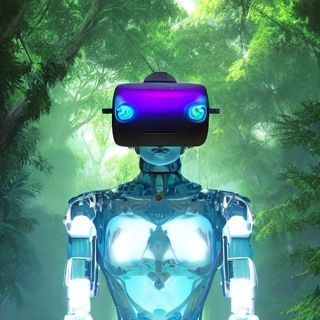
Artificial Intelligence, often abbreviated as AI, is a transformative technological marvel that has captured the imagination of both scientists and science fiction enthusiasts alike. In recent years, AI has moved from the realm of fiction to reality, rapidly evolving and impacting numerous aspects of our lives. This essay delves into the fascinating world of AI, exploring its history, current applications, ethical concerns, and the promising future it holds.
I. The Evolution of Artificial Intelligence
AI's roots can be traced back to ancient civilizations where myths and legends of intelligent machines were born. However, it wasn't until the mid-20th century that AI as a formal field of study emerged. The term "Artificial Intelligence" was coined by John McCarthy in 1955. Early AI pioneers like Alan Turing and Marvin Minsky laid the theoretical foundations for the field.
The development of AI can be categorized into several phases:
1. Symbolic AI: In the 1950s and 1960s, AI primarily focused on symbolic reasoning. Researchers created rule-based systems capable of solving logical problems, but these systems were limited in their ability to handle uncertainty.
2. Machine Learning: In the 1980s and 1990s, AI shifted towards machine learning techniques. This approach allowed computers to learn from data and make decisions based on patterns. Neural networks, inspired by the human brain, gained prominence during this period.
3. Big Data and Deep Learning: With the advent of big data and increased computing power, deep learning emerged as a dominant AI paradigm. Deep neural networks, capable of processing vast amounts of data, revolutionized fields like image and speech recognition.
II. Applications of AI Today
AI has infiltrated almost every aspect of our lives, often without us even realizing it. Here are some notable applications:
1. Healthcare: AI aids in disease diagnosis, drug discovery, and personalized medicine. Machine learning algorithms analyze medical records to predict diseases and recommend treatment options.
2. Finance: AI algorithms drive automated trading systems, fraud detection, and credit scoring. They process vast datasets to make real-time investment decisions.
3. Transportation: Self-driving cars, powered by AI, are on the verge of reshaping the automotive industry. AI also optimizes traffic management and enhances navigation systems.
4. Natural Language Processing (NLP): Virtual assistants like Siri and Alexa rely on NLP to understand and respond to human speech. NLP is also used for sentiment analysis and language translation.
III. Ethical Concerns and Challenges
The rapid advancement of AI brings forth ethical dilemmas and challenges that society must address:
1. Job Displacement: As AI automates tasks, concerns about job displacement have arisen. However, AI also creates new job opportunities in fields like AI ethics, data analysis, and AI system development.
2. Bias and Fairness: AI systems can inherit biases present in their training data, leading to unfair outcomes, especially in areas like criminal justice and lending. Ensuring fairness and transparency in AI decision-making is crucial.
3. Privacy: AI's ability to process and analyze data raises concerns about individual privacy. Striking a balance between data-driven insights and privacy protection is an ongoing challenge.
4. Existential Risks: Some experts worry about the long-term risks associated with superintelligent AI. Safeguarding against misuse and unintended consequences remains a top priority.
IV. The Promising Future of AI
While AI poses challenges, it also holds immense promise:
1. Healthcare Advancements: AI is poised to revolutionize healthcare with precision medicine, early disease detection, and AI-assisted surgeries.
2. Environmental Impact: AI can optimize energy consumption, reduce waste, and enhance climate modeling to address pressing environmental issues.
3. Education: Personalized AI-driven education platforms can adapt to individual learning styles, making education more effective and accessible.
4. Scientific Discovery: AI aids in scientific research, from simulating complex phenomena to analyzing vast datasets in fields like astronomy and genomics.
Conclusion
Artificial Intelligence has come a long way since its inception, and its journey is far from over. As AI continues to evolve, society must grapple with ethical challenges while harnessing its transformative power. The future of AI promises unprecedented advancements in various fields, making it one of the most exciting and impactful technologies of our time.
Follow Gabriel Nainggolan to stay updated on their latest posts!
0 comments
Be the first to comment!
This post is waiting for your feedback.
Share your thoughts and join the conversation.
